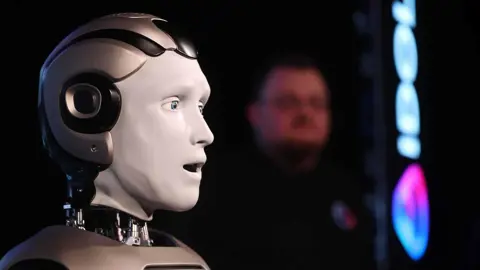Robot AIDOL's Debut in Moscow Takes an Unexpected Turn

In Moscow, the unveiling of the Russian humanoid robot "AIDOL" took a humorous turn when it lost its balance and fell to the ground just moments after starting its presentation at a modern technology fair.
The robot made its entrance to the iconic theme music from the movie "Rocky," accompanied by two members of its development team, attempting to wave to the audience. However, the gesture ended abruptly as it toppled over, eliciting laughter from attendees and quickly becoming a viral sensation on social media, as reported by the Washington Post.
Organizers swiftly lowered the curtain to conceal the situation while technical staff hurried to remove the robot from the stage, as the audience continued to capture the moment on their devices, which sparked a flurry of sarcastic commentary online.
The "AIDOL" robot, named after its developing company registered in August 2025, stands at 1.86 meters tall and weighs approximately 95 kilograms. It is designed to display over 12 facial expressions, can carry up to 10 kilograms, and move at speeds nearing 6 kilometers per hour, according to the company’s website.
Vladimir Vitokhin, the CEO of the company, mentioned that the robot underwent various tests on different surfaces, suggesting that the fall might have been caused by an electrical voltage fluctuation or lighting effects in the venue. He humorously remarked, "Perhaps it won the audience's sympathy... and that’s part of its job!"
"AIDOL" is a key project under Russia's "new technological alliance," a platform that connects robotics firms and technical universities with the aim of developing a new generation of humanoid robots, with plans to attract investments of up to $50 million.
Alexei Yujakov, the alliance president and founder of "Promobot," confirmed that the robot is equipped with artificial intelligence capabilities, allowing it to learn from experiences. He emphasized that efforts would continue to enhance its performance following the incident. This development occurs against the backdrop of a global race led by major companies like Tesla, Meta, and Google to create humanoid robots, with economic forecasts predicting that the United States will have over 78 million humanoid robots by 2050.
